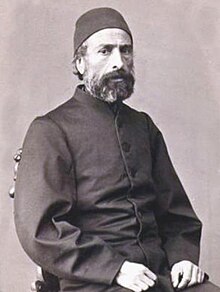İbrahim Edhem Pasha
|
Ibrahim Edhem Pasha |
|
|---|---|

Photograph of Ibrahim Edhem Pasha by Abdullah Frères, circa 1890.
|
|
| Grand Vizier of the Ottoman Empire | |
|
In office 5 February 1877 – 11 January 1878 |
|
| Preceded by | Midhat Pasha |
| Succeeded by | Ahmed Hamdi Pasha |
| Ottoman Minister for the Interior | |
|
In office 1883–1885 |
|
| Ottoman Ambassador at Berlin | |
|
In office 1876–1876 |
|
| Ottoman Ambassador at Vienna | |
|
In office 1879–1882 |
|
| Personal details | |
| Born | 1819 Chios, Ottoman Empire |
| Died | 1893 Constantinople, Ottoman Empire |
| Religion | baptised Greek Orthodox Christian, converted to Islam |
Ibrahim Edhem Pasha (1819–1893) was an Ottoman statesman of Greek birth who held the office of Grand Vizier in the beginning of Abdulhamid II's reign between 5 February 1877 and 11 January 1878. He served numerous administrative positions in the Ottoman Empire including minister of foreign affairs in 1856, then ambassador to Berlin in 1876, and to Vienna from 1879 to 1882. He also served as Army Engineer and minister of interior from 1883 to 1885. In 1876-1877, he represented the Ottoman Government at the Constantinople Conference.
He was born in Chios of Greek ancestry, in a Christian Greek Orthodox village on the island of Chios. Strangely, his connection to Chios is not well-documented: his son Osman Hamdi Bey claimed that he was a member of the Skaramanga family, but Edhem Pasha himself tried to efface his Greek connections.
As a young boy in 1822, he was orphaned and captured by Ottoman soldiers during the massacre of the Greek population of Chios. He was sold into slavery, brought to Constantinople, and adopted by the (later) grand vizier Hüsrev Pasha. Lacking his own children and family, Hüsrev Pasha raised about ten children who had been orphaned or bought as slaves, many of whom ascended to important positions.
The child, now named İbrahim Edhem, quickly distinguished himself with his intelligence and after having attended schools in the Ottoman Empire, he was dispatched along with a number of his peers, and under the supervision of his father, then grand vizier, and of the sultan Mahmud II himself, to Paris to pursue his studies under state scholarship. There he returned a Bachelor of Arts, and was one of the top pupils at the École des Mines. He was a classmate and a friend of Louis Pasteur. He thus became Turkey's first mining engineer in the modern sense, and he started his career in this field.
...
Wikipedia
